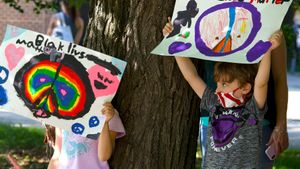Rallies erupted across Australia this past Sunday, as citizens gathered to voice their support for Palestine amid the surging tensions stemming from the Israel-Gaza conflict. Tens of thousands of people, including families and individuals of diverse backgrounds, flooded the streets of major cities such as Sydney and Melbourne, demanding justice and peace for those affected by the violence.
Many participants carried banners and placards bearing powerful messages, calling for an end to the violence and expressing solidarity with Palestinians. One protester, holding up a sign, declared, "Free Palestine!" echoing chants heard throughout the gatherings. The atmosphere was charged with emotion, as speakers at various locations urged the government to take action and reconsider its stance on the conflict.
Notably, the Australian Prime Minister, Anthony Albanese, faces scrutiny from both sides of the political spectrum concerning the nation's foreign policy on the Israel-Gaza crisis. Albanese's office stated they have been monitoring the situation closely, yet many critics argue his reactions have lacked sufficient strength. Opposition leader Peter Dutton has accused the government of not doing enough to support Israel during this escalated conflict, adding another layer of complexity to the political dialogue surrounding the protests.
The rallies also included arguments for peace and harmony, with numerous speakers discussing the humanitarian plight faced by civilians caught in the crossfire of the conflict. A powerful moment occurred when former Australian senator and pro-Palestinian advocate, Lee Rhiannon, took the stage to remind attendees of the importance of dialogue and diplomacy. “Peace can only be achieved through mutual recognition and respect for both people’s rights,” she stated passionately, prompting cheers from the crowd.
Ironically, the fervor of the protests was contrasted by incidents marking the day, including arrests related to provocative signage and heightened police presence to maintain order. Authorities received reports about individuals displaying controversial imagery, including symbols associated with extremism. Police intervened to manage the crowd and lay down strict guidelines on the demonstrations, emphasizing the importance of maintaining peace.
Internationally, the situation remains volatile. Following recent escalations, nearly 42,000 reported fatalities reverberate within Gaza, prompting calls for immediate ceasefires and humanitarian aid. The Israeli Defense Forces (IDF) have recently heightened airstrikes aimed at Hamas installations, intensifying fears of wider regional conflict. This escalation has begun to draw international attention, with various nations, including Australia, urging for de-escalation of the violence.
Meanwhile, the community response is multifaceted, informed by renewed fears of extremism and rising anti-Semitism, factors which have complicated peaceful protests. Pro-Palestinian activists have faced backlash, including threats and violence, showcasing the increasingly polarized atmosphere surrounding discussions of Middle Eastern politics.
The turmoil continues with the Iranian government recently halting flights from its airports, citing operational restrictions, coinciding with its missive toward Israel. Premiering responses from both Israel and Iran highlight the deteriorated relationships and the impact they have across the Middle East. Israeli officials, including Prime Minister Benjamin Netanyahu, are on the defensive, particularly after vocal criticisms of France over its suggestion to halt weapon sales to Israel during this crisis. Netanyahu openly rebuked French President Emmanuel Macron, accusing him of not comprehending the severity of the situation.
Closer to home, Australian officials have had to balance diplomatic approaches amid rallies calling for political boycotts against Israel. The Australian Tertiary Education Union has already endorsed such measures. Many within academic circles feel vocalizing their opposition to the violence is not enough, advocating for tangible steps toward boycotts and disinvestment campaigns targeting Israel.
Despite the political tension, people on the ground continue to engage, providing commentary on the urgent need for action. Melissa, one of the participants from Sydney, expressed her frustrations succinctly: “We can't just sit back and watch! We need to stand up for those who can’t.” Such sentiments overflow at every rally, united under the umbrella of humanity and the quest for peace.
With the anniversary of the conflict’s escalation approaching, many anticipate this week to be pivotal, likely seeing increased tensions coupled with heightened protests around the globe. Observations from within and outside Australia point toward potential for more demonstrations, emphasizing how personal experiences and international actions intertwine deeply.
For now, the rallies symbolize more than just dissent; they are cries from the heart calling for empathy and resolutions. The future remains uncertain, and as the situation continues to develop, the hope for peace rests on the shoulders of many individuals advocating for positive change.



